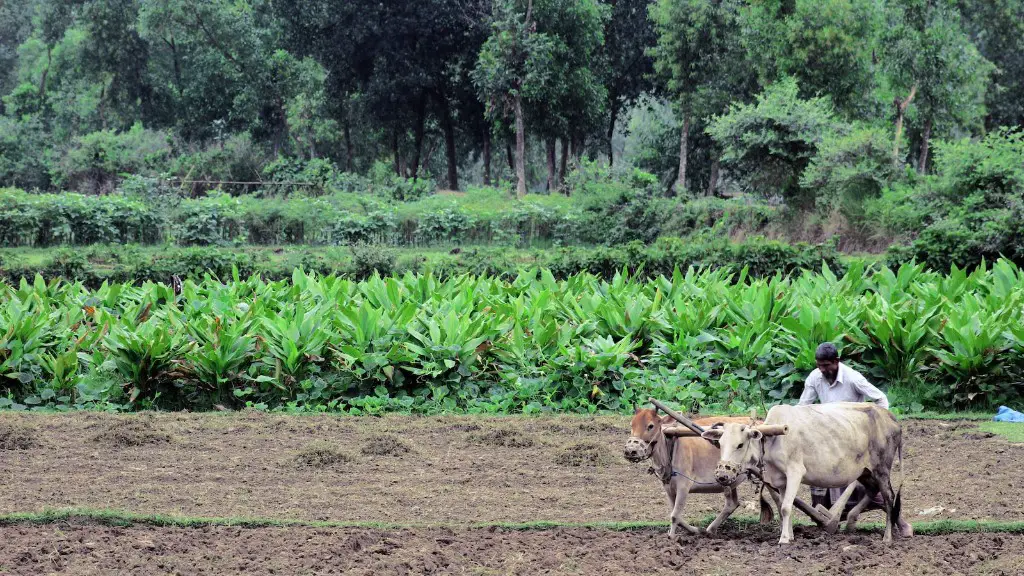Agriculture is a viable career choice in India, as it provides a variety of roles, including farming, rural development, and supply chain and logistics management. Agricultural jobs are important for India’s development and growth, as it is the main source of employment for the majority of India’s population. Additionally, the Indian agricultural sector contributes significantly to the country’s GDP. The Indian agricultural sector accounts for over 17% of India’s GDP and provides employment to approximately half of India’s workforce. While farming may not be the most lucrative or glamorous career choice, it is one that is critical for the economic development of the country.
The agricultural sector in India is growing, largely due to increased government support and initiatives promoting sustainable and efficient farming practices. This growth has created a large number of employment opportunities in the sector and makes a career in agriculture an attractive option. There are a number of different jobs available ranging from field work such as sowing, harvesting and looking after livestock to managerial and marketing roles available in companies in the agri-business sector. There has also been a rise in agricultural science jobs, such as agricultural engineers, agronomists, agricultural economists and biotechnologists, all of which are important for the advancement of sustainable agriculture.
A career in agriculture is an opportunity to contribute to a green and sustainable future. Agricultural jobs have significant economic, environmental and social benefits. Agricultural jobs provide an income to many marginalised agricultural labourers, as well as providing food security to poor and rural communities. The sector also plays an important role in reducing poverty and improving rural livelihoods. Additionally, the sector has a social impact in rural India as it provides a source of employment, creates livelihoods and helps to ensure food security for vulnerable communities.
Agricultural jobs are a great way to improve the livelihoods of farmers and contribute to the economic development of rural India. There are a wide range of career paths available in the agricultural sector, ranging from field work to managerial roles to technical and scientific posts. These jobs provide an opportunity to gain valuable work experience whilst also providing an important service to the country. Furthermore, those working in the sector are contributing to the future of the country by helping to develop sustainable and environmentally friendly strategies to ensure food security.
In conclusion, agriculture is a great career choice in India. It offers a variety of job roles, has significant economic and social benefits, and provides a service to the country. Those working in the sector are helping to ensure food security and develop sustainability strategies for the future. Agriculture is a viable career choice for those who want to make a positive contribution to India’s development and growth.
Opportunities for Growth
Farming is an essential part of life and one that is important for India’s economic development. The government is also providing support and initiatives to improve the agricultural sector’s efficiency, which creates numerous employment opportunities. With these opportunities come the potential for professional growth and development in the agricultural sector. Individuals working in agriculture can gain valuable work experience and develop their skills, furthering their career prospects.
Within the agricultural sector, there is a range of roles available, both at a local and national level. Roles such as sowing, harvesting and livestock management require basic skills such as knowledge of crops and good agricultural practices, while managerial and marketing roles require more specialised skills such as management, business and computing. Those with a background in agricultural science can also apply their knowledge to technical roles such as agricultural engineers, agronomists and biotechnologists. The scope of growth and development within the agricultural sector is vast and provides individuals with opportunities to further their career.
Individuals who are passionate about agriculture and want to make a positive contribution to India’s development should consider a career in the sector. There is a wide range of jobs available, offering the potential for growth and development. By working in the agricultural sector, individuals can help ensure food security for the country, contribute to a green and sustainable future and take advantage of increasing government initiatives and support.
Educational Requirements
In order to pursue a career in the agricultural sector, individuals must fulfill certain educational requirements. For many roles in the sector, a degree in an agricultural-related field is required. These degrees can include areas such as agricultural engineering, agricultural economics, agronomy, food science and biotechnology. Additionally, many agricultural jobs require a working knowledge of farming and agricultural practices, as well as an understanding of the sector’s marketplace and managerial skills.
Those pursuing a career in agriculture should have an interest in the sector and a passion for helping to develop sustainable agriculture. They should also have knowledge of relevant agricultural practices and experience working with animals and plants. Additionally, they should be able to work in a team environment and have a willingness to learn and develop new skills. Furthermore, individuals working in the sector must have a good understanding of technology, as many agricultural jobs require the use of computers and other technologies for data analysis and management.
In addition to educational requirements, those working in the field of agriculture must adhere to certain codes of conduct and regulations. Many agricultural jobs require workers to meet strict quality standards, use safe practices and follow laws and regulations pertaining to agriculture. Individuals must also understand their responsibilities and abide by the terms and conditions of their employment agreements. Therefore, those wishing to pursue a career in agriculture must take the necessary steps to ensure that they are qualified and have the necessary knowledge and skills necessary to safely and effectively perform their job.
Advantages of a Career in Agriculture
A career in the agricultural sector has numerous advantages. Firstly, it provides individuals with the opportunity to work outdoors in a variety of roles. Additionally, they are able to gain valuable work experience and develop their skills in the process. Furthermore, agricultural jobs have social as well as economic importance. They provide employment to many marginalised agricultural labourers and help to ensure food security for vulnerable communities.
Agriculture also offers a great opportunity for those interested in working with animals. There are numerous job roles available relating to the management and care of livestock, from veterinary care to breeding and nutrition. Working with animals can be an immensely rewarding experience, as it is a great way to contribute to the improvement of animal welfare and health. Additionally, many agricultural jobs provide a steady income and offer benefits such as health insurance, retirement plans and bonuses.
Finally, agriculture is an important industry in India. A career in the sector is an opportunity to contribute to the economic growth of the country, as well as providing a service for the community. Those working in agriculture can take pride in knowing that they are helping to ensure food security for the country, as well as contributing to the development of sustainable agricultural practices.
Challenges of a Career in Agriculture
A career in the agricultural sector can present certain challenges. Firstly, due to the nature of the job, individuals may be required to work long hours and during weekends. Additionally, agricultural jobs often involve strenuous physical labour, and can be very demanding and tiring. Furthermore, many of the roles available in the sector require individuals to be away from home for long periods of time, which can be difficult for families.
Pursuing a career in agriculture also comes with certain risks. For example, there is the risk of injury due to working with animals and hazardous machinery. Additionally, agricultural jobs can involve working in inclement weather, and those working in the sector may be exposed to extreme temperatures. Furthermore, those working in the agricultural sector have to adhere to strict regulations and laws, which must be taken seriously.
Agriculture is a valuable industry, but it can present certain challenges. Individuals must be prepared for a physically and mentally demanding job and must be aware of the risks that come with the job. However, with the right training, dedication and a willingness to learn, a career in agriculture can be both rewarding and fulfilling.
The Impact of Technology and Innovation on a Career in Agriculture
Technology and innovation have the potential to revolutionise the agricultural sector and revolutionise careers in agriculture. Increasing levels of technological advancements and the development of new technologies can improve the efficiency and productivity of the sector, leading to higher crop yields and improved livelihoods. The introduction of new technologies can enable farmers to adopt more sustainable farming practices and to better respond to changing market conditions.
The use of technology and innovation in the agricultural sector also opens up a range of new job opportunities. From data management and analysis to development of new seeds and products, advanced technological tools and innovative approaches can create new and exciting roles. Additionally, technological advancements can also create more efficient and cost-effective methods of farming and provide access to markets and resources previously unavailable.
Finally, technological innovation presents individuals with the opportunity to grow their career prospects and develop skills in novel areas. Those working in the sector can take advantage of the opportunities available to learn and develop new technical and managerial skills. Technology and innovation in agriculture present an exciting opportunity for those working in the sector to strengthen their career prospects and help to ensure a green and sustainable future for the country.




